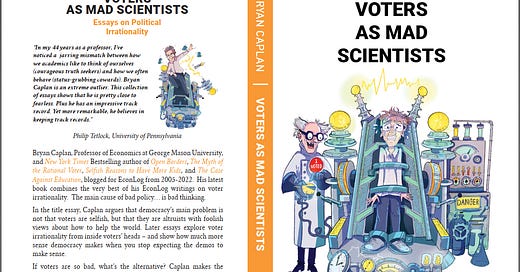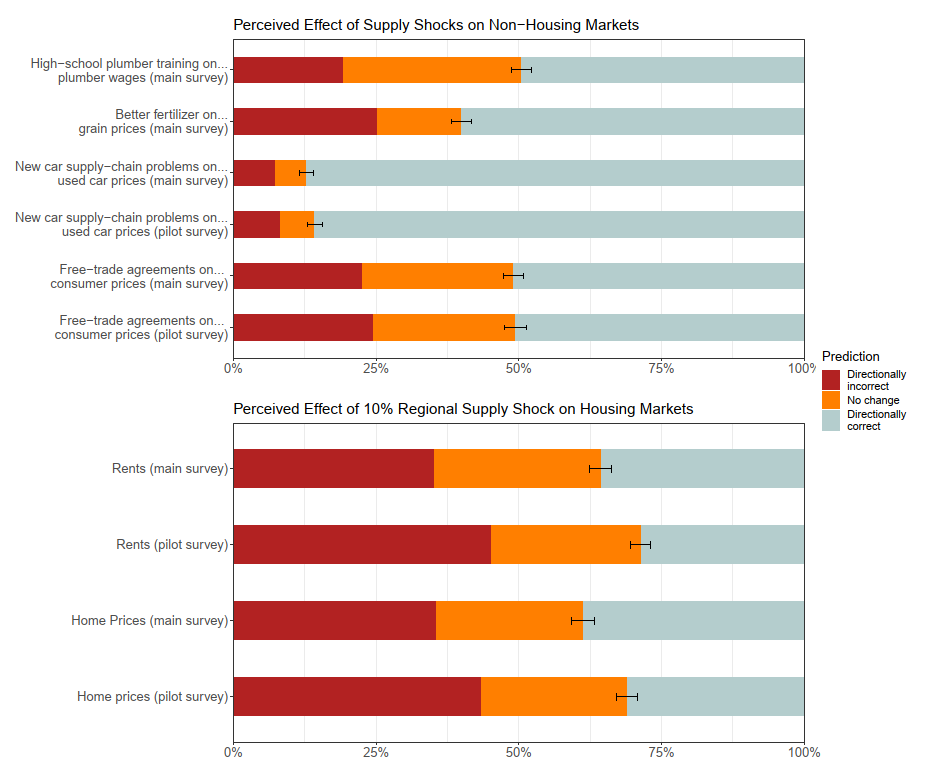NIMBY Is Economic Illiteracy
Denial of the obvious, not self-interest, is what strangles construction
Why is housing regulation so draconian? The conventional answer is self-interested voting. Housing regulation is mostly local; local voters are mostly homeowners; homeowners want high housing prices; homeowners know low supply keeps prices high. Economists are especially staunch in their belief in this classic NIMBY (Not In My Backyard) story.
Part of the reason is that economists like self-interested stories of everything. In daily life, this is a reasonable presumption. But in politics, most economists have yet to realize that theory and empirics stand squarely against what I call the Self-Interested Voter Hypothesis. Since one voter has near-zero effect on political outcomes, there is near-zero reason to vote on the basis of material self-interest. And a mountain of public opinion research confirms that “symbolic attitudes” - especially ideology and group identity - are the main determinants of issue views, partisanship, and voting itself.
But even economists who accept these truths will still probably try to carve out an exception for housing regulation. What ideology urges us to make housing as expensive as possible?! If naked self-interest doesn’t explain draconian regulation, what on Earth does?
My top explanation is sheer economic illiteracy. Much of the public flatly denies that housing deregulation would make housing more affordable. For them, supply-and-demand is the “ideology” - and popular complaints about the downsides of new construction are “common sense.”
Do I have any evidence that economic illiteracy is the foundation of draconian housing regulation? Until recently (with notable exceptions), I only had base rates. Since there is overwhelming evidence of the public’s economic illiteracy, of course they’ll be economically illiterate on housing as well. But in 2022, Clayton Nall, Chris Elmendorf, and Stan Oklondzija (henceforth NEO) ran a large survey on the origins of NIMBY. Their recent paper, “Folk Economics and the Persistence of Political Opposition to New Housing” strongly supports my story.
What NEO did:
We pursued these questions through two surveys with preregistered analysis plans fielded on the Bovitz Forthright panel with a sampling frame defined as adult residents of U.S. urban and suburban zip codes. We instructed the survey vendor to collect equal proportions of homeowners and renters, and to balance the sample on demographics including age, race and gender. The first or pilot survey (n≈2,500) was fielded in March of 2022 and the main survey (n≈3,000) in August of the same year. The findings of the pilot are reported in the Supplemental Information except where the main survey replicates or extends a question from the pilot, in which case we plot results from the pilot alongside the corresponding result from the main survey.
Both surveys open with basic demographic questions and, amidst the demographics, a question that asks respondents to think about their city’s future and whether they would prefer home prices and rents to be higher, lower, or the same as today, assuming no change in the economy or quality of life. The surveys then present supply-shock scenarios, elicit perceived effects of the shock on home prices and rents, ask about support for “upzoning” (reducing restrictions on the development of housing), and query respondents about the effects of supply shocks in non-housing markets.
What NEO found:
In the pilot survey, only about one-third of respondents stated that a 10% positive supply shock would reduce rents and home prices, and a larger number (about 40-45%) answered that a 10% supply shock would increase prices of existing housing. The results in the second column of 4.1 show modestly lower levels of Supply Skepticism in the main survey.
Graphically:
Look closely. In both studies, the public’s average predicted effect of increased supply on housing prices is roughly ZERO. The median prediction is ALWAYS zero. Homeowner self-interest barely seem to matter at all:
The pilot and main surveys yield very similar results, with minimal differences as a function of housing tenure or preferences for higher or lower prices and rents. That owners’ rent predictions are very similar to those of tenants is particularly significant, as it implies that Supply Skepticism is not just a way that owners rationalize self-interested opposition to new housing, i.e., by asserting that it won’t help less-fortunate renters.
When NEO test for economic illiteracy in other markets, they detect it. But the economic illiteracy is especially egregious for housing:
NEO emphasize the prevalence of textbook reasoning for fertilizer and used car markets, but it’s worth pointing out that the public is pretty awful on free trade and occupational licensing too. If roughly half of the population doubts that restricting supply raises prices, what’s the downside of restricting supply for the flimsiest of reasons?
Though NEO explore a lot of other angles, the central message is that economic illiteracy - or as they term it, “Supply Skepticism” - is the factor that explains the wreckage of our status quo:
Our results suggest a new explanation for a behavioral puzzle observed in the local political economy literature, namely, that renters are not always supportive of new housing. Hankinson (2018) argues that renters oppose new projects in their neighborhoods out of anxiety that the local amenity effects of new developments will cause their rents to rise. Yet we show that most renters disbelieve that even a large, region-wide increase in the number of new homes would put downward pressure on rents. In a similar deviation from ideal-type behavior, homeowners do not universally believe that a large regional supply increase would reduce home values—and they are not monolithically opposed to additional housing development. Although renters in our samples were somewhat more supportive of land-use liberalization than homeowners, the differences are only 5-10 percentage points, and they pale in comparison to the gap in support, among renters and homeowners alike, for transit-oriented development as compared to “gentle” density in neighborhoods of single-family homes.
Is this good news or bad news? As I’ve argued before, given the existence of awful policies, it’s good news. If the status quo were a durable expression of self-interest, it would be nigh invulnerable. Why? Because (a) human nature won’t change, and (b) the costs of bargaining are plainly too high to reconcile our conflicting self-interests. Otherwise, such bargaining would be common already, and we wouldn’t find ourselves in our current predicament. If the problem is economic illiteracy, however, at least we don’t have to change human nature to dramatically change policy. Perhaps we can just repeatedly hit the public over the head with a friendly sledgehammer of economic education.
A friendly sledgehammer like… a non-fiction graphic novel on housing regulation.
Subscribe to Bet On It
Caplan and Candor














The problem with even the best economic analysis (admittedly the only kind on this substack) is that people don't live in an economy -- they live in a neighborhood, a community, a town, a nation. Or, rather, they did. At some point, "do I want my town to fill up with people who don't like me and aren't like me even if there are proven economic benefits?" flips from 'yes' to 'no'.
Similarly, many people could double the rent they make from the spare room by kicking out grandma and renting to a hard-working family of four, and can make even more by renting out the garage and building an ADU in the backyard, but not everything is about money. Not for everyone.
But Brian, why do we assume that house owners have strong economic interests at all behind their nimby-ism? I know I'm a NIMBY by nature (luckily I don't live in a place where it would matter), but my stance does not depend on my economic understanding of things (which is weak). It's pure visual preference. I'm not planning to sell my real-estate. But should the "historical milieu saving" restrictions in my part of town be lifted and new high-rises get built around my house, I would be forced to sell and move to another place, losing a lot of value (whatever it is - costs of moving, having to live father away from workplace, loss of the garden that I've been cultivating for many years and that is just starting to reach maturity). I'd have to move because my visual preferences for the surroundings are very strong. A large percentage of the people inhabiting this part of town are like me - they came for the romantic surroundings (it's not extremely beautiful, but it's kind of romantically old and slummy). They would all have to go. The cost of apartments is not what they care about when they discuss building restrictions.